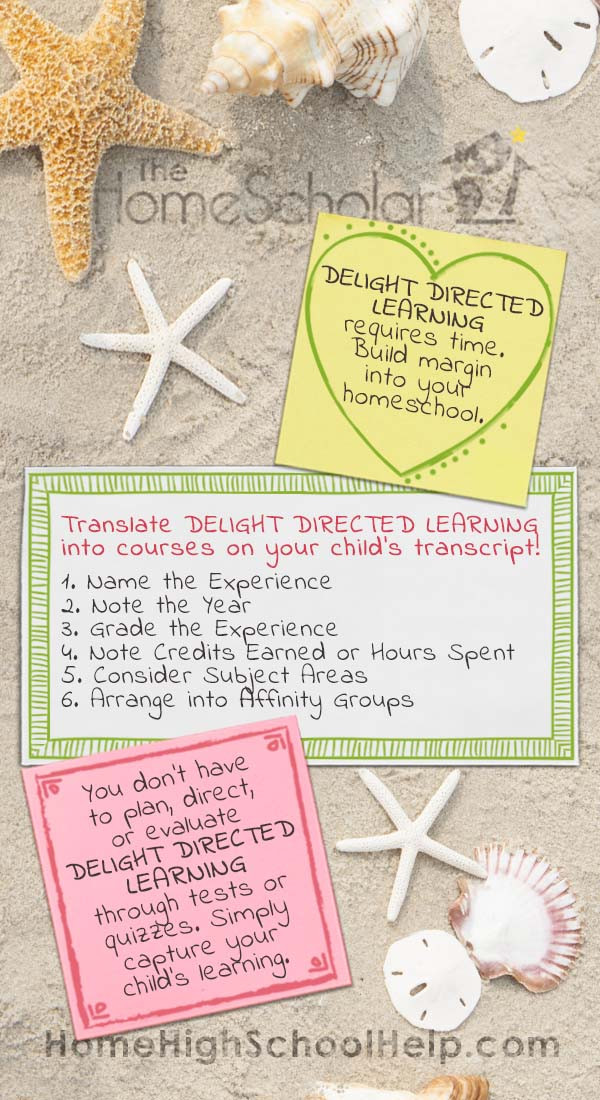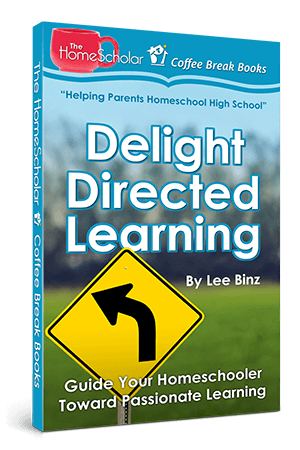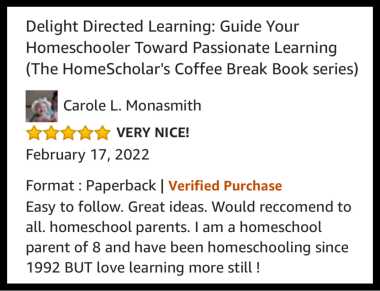Delight Directed Learning at the High School Level
Not everything that homeschoolers study is easy to translate into a high school credit. For instance, what do you do if your child learns best by living, instead of studying textbooks? What if your child soaks up knowledge like a sponge, without being directed in any way? Can you still put that activity on a high school transcript?
I once heard a mom say, "My son's interested in something that's not a real academic course—he's mapping the moons of Jupiter." Another mom once told me, "I really need to teach my child music because all he ever does is play bluegrass, and bluegrass isn't real music." I almost laughed out loud! Bluegrass music is music, and mapping the moons of Jupiter is astronomy, and both of these students were engaged in what I call "delight directed learning."
Delight directed learning is when a person pursues learning about a topic because they take great delight in it, and not just because it's a required course.
When you're looking for resources, parents have unlimited choices when it comes to delight directed learning. Make sure you include curriculum that covers all the basics for sure — you can't skimp on reading, writing, math, science, and social studies. But you also want to look for curriculum that will encourage your child's passion! If they love art, music, or science, remember to buy those! If they ask for microbiology, or economics, or Russian History, follow their interests and get it for them.
Use a Light Touch
Don't, however, take those passions and turn them into a "school subject." I remember one mom who wanted to encourage her student's delight, and so she turned it into a homeschool course—complete with assignments, worksheets, and tests. Strangely enough, her student lost interest in the subject when it became a dreaded "class" that he had to work on! How can you encourage a passion in your child without making it into a school subject? It's actually very simple and consists of only three steps: find a mentor, don't work ahead, and follow behind.
Find a Mentor
Encourage them in their interests by finding mentors through clubs and colleges. You may need to Google a specific term such as "ornithology clubs" to find a group, but you will find many options to choose from. You can find mentors by contacting small, friendly colleges to find a helpful professor. Ask around at church and other community groups to see if you can find an adult with the same interests. It took a LONG time asking before we found a mentor in economics for my son. The first two we tried weren't a good fit, but they eventually led to a great professor who really took my son under his wing. Ask yourself: if you had that interest as an adult, how would YOU find a way to meet like-minded people?
Of course, that also means that you have to go with your child, drive them, wait for them, and all the other inconvenient things that happen to parents that encourage their children's interests. Sorry about that! I got to be good friends with my barista during those years of my life! You can also search curriculum catalogs and see what books and curriculum your child seems to love. My son actually ASKED for Sonlight American Government when he was young, just because he was interested. Let them look in the catalog. Watch videos, and listen for clues about how to get involved while your child is just enjoying the content.
Don't work ahead of them by writing tests or worksheets. You don't have to assess them with tests, just look at what they are doing and saying. Allow them to write school papers on the topic of their choice. Then if they produce some high school writing on the subject they love, you can include that in your documentation of the class. I tried OFTEN to give them the choice of writing topics. Toward the end of the year I would have to say, "Ok, but this time NOTHING on economics or American history!"
Follow Behind
Follow along behind them as they enjoy their interests. Try to capture what you can for class documentation: writings, drawings, work experiences, records of group meetings, etc. Just grab samples of what they do for fun, without making them do anything. When the year is done, you can group those experiences together and use it as a course description of what was covered. Use my "Sticky Note Strategy" to collect and distribute their interesting experiences. Collect their interests into groups that you can call "classes." (For more information, see the chapter about Delight Directed Learning in the Total Transcript Solution.)
Cover Core and Capture
Parents do need to find a balance with delight-directed learning, however. You want to both cover the core classes and capture delight directed learning. Cover the core classes of reading, writing, math, science, and social studies. Each family will have classes they consider non-negotiable core classes. Within those core classes, try to teach them in an interesting way. It's possible to teach core subjects with delight-directed classes, but make sure you cover the core one way or another.
Once the core is covered, capture the delights of your child, and translate them into courses on your transcript. Remember, you don't have to plan, direct, or evaluate with tests and quizzes. Just capture the learning. Count hours, if necessary, to determine how many credits the class should be. Roughly 120-180 hours can be a whole credit, and about 60-90 hours might be a half credit class.
Love Learning
When you homeschool, you want to include as much delight-directed learning as possible. It isn't because we want school to be easy or fun, but because we want it to be interesting and applicable. When school is interesting, they will learn more and they will begin to LOVE learning more. We had "Self Directed Courses" in our homeschool; critical thinking, public speaking, occupational education, and Russian history were on one of my son's records. My other son had self-directed courses in economics, microeconomics, macroeconomics, business law, psychology, and marketing.
It's possible for kids to learn things JUST because they love it! Your job as parent is to pick up the mess they leave behind, and turn it into a wonderful course description of what they have learned! I think that's the best kind of learning!
To learn more about delight directed learning, check out my book Delight Directed Learning: Guide Your Homeschooler Toward Passionate Learning on Amazon:
Allison found peace with Gold Care Club!
I've been following your column/blog/FB/emails for several months now, assuming I was preparing myself for homeschooling high school in 2 years - little did I know, my son would decide to come home from public school 3 weeks ago, so I've been thrust into this position all of a sudden!
And, I must say, without your cyber-support, I'm sure I'd have had a panic attack or worse. I was headed that a way when I received an email about "Credits and Grades and Transcripts, OH MY!!" I watched it, joined the Silver Club, typed an email, upgraded to the GOLD Club, and suddenly - I was at peace...everything began falling into place. I realized my stress was coming from the fact that I was trying to change my method of homeschooling just because of age level. I was going to a textbook-and-test-on-Fridays school instead of the literature-based approach we've always enjoyed.
Somehow, it all fell into place. Watching a couple of webinars helped me focus my thinking and get back on track. I'm looking forward to talking with Lee on Wednesday and having a sounding board for ideas and other options re: homeschooling high school.
Thanks again!
~Allison
When you subscribe to the blog, we will send you an e-mail when there are new updates on the site so you wouldn't miss them.

 Login
Login












.jpg)

Comments